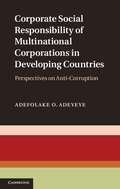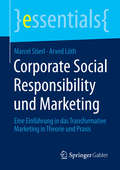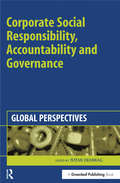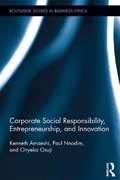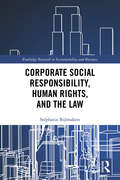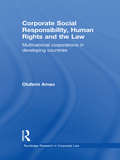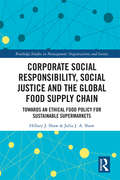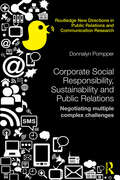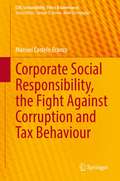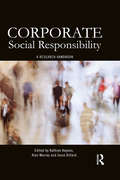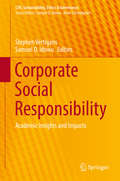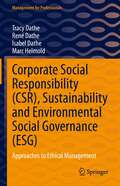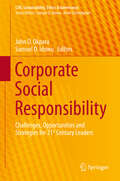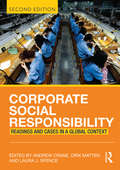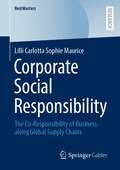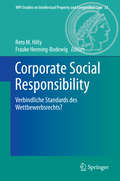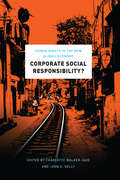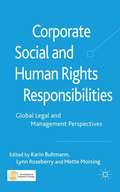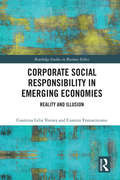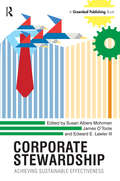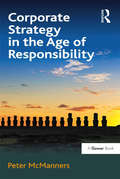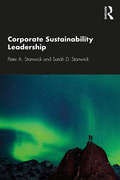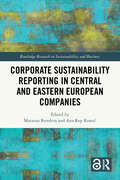- Table View
- List View
Corporate Social Responsibility of Multinational Corporations in Developing Countries
by Adefolake O. Adeyeye"The increasing importance of CSR means that companies must consider multi-stakeholder interests as well as the social, political, economic, environmental and developmental impact of their actions. However, the pursuit of profits by multinational corporations has led to a series of questionable corporate actions and the consequences of such practices are particularly evident in developing countries. Adefolake Adeyeye explores how CSR has evolved to aid the anti-corruption campaign. By examining voluntary rules applicable for curbing corruption, particularly bribery and analysing the domestic and extra-territorial laws of Nigeria, United Kingdom and the United States for holding corporations liable for bribery, she assesses the adequacy of international law's approach towards corporate liability for bribery and explores direct corporate responsibility for international corruption. The roles of corporate governance, global governance and civil liability in curbing corporate corrupt practices are given special focus"--"The increasing importance of CSR means that companies must consider multi-stakeholder interests as well as the social, political, economic, environmental and developmental impact of their actions. However, the pursuit of profits by multi-national corporations has led to a series of questionable corporate actions, and the consequences of such practices are particularly evident in developing countries"--
Corporate Social Responsibility und Marketing: Eine Einführung in das Transformative Marketing in Theorie und Praxis (essentials)
by Marcel Stierl Arved LüthZur praktischen Umsetzung von Corporate Social Resonsibility (CSR) stellen Marcel Stierl und Arved Lüth erstmals das Konzept des transformativen Marketing vor und ergänzen es mit Tools aus der Beratungspraxis. Konkrete Instrumente und Fallbeispiele erleichtern eine Umsetzung von CSR in die Unternehmenspraxis. CSR ins Marketing zu integrieren, bedeutet die eigene Geschäftstätigkeit ökonomisch, ökologisch und sozial weiterzuentwickeln und sich gegenüber seinen Stakeholdern entsprechend zu positionieren. Zusätzlich sollten Stakeholder zu nachhaltigen Verhaltensweisen informiert und animiert werden.
Corporate Social Responsibility, Accountability and Governance: Global Perspectives
by Istemi DemiragThe "business case" for corporate social responsibility, which suggests that socially and environmentally aware companies can expect to reap financial rewards, is seemingly gaining widespread acceptance within the business community. This is particularly apparent in the ever-increasing number of prominent companies parading their social, ethical and environmental credentials by producing paper- or web-based social and environmental, or sustainability, reports. In so doing, reporting companies claim, they are demonstrating a clear commitment to transparency and accountability to their key stakeholder groups. However, in the prevailing voluntaristic, business-case-centred climate within which such initiatives are taking place, little thought appears to have gone into the question of how stakeholders, other than the capital provider group, can actually use corporate disclosures offered in order to hold management accountable for the social and environmental consequences of their actions. While much corporate rhetoric abounds concerning notions of stakeholder dialogue and engagement, rigorous analysis of the governance implications of their claimed commitment to the principles of corporate social responsibility is largely conspicuous by its absence. Corporate Social Responsibility, Accountability and Governance seeks to explore this "missing link" between CSR (and associated reporting initiatives) and governance mechanisms that are capable of embracing true stakeholder accountability. A wide range of case studies, drawing on experiences of both public- and private-sector initiatives in Europe, the United States, Canada, South America and Asia, offer insightful analysis of the complex relationships between the state, the market and civil society in the development of CSR, accountability and sustainable development. The book employs a multidisciplinary perspective in order to analyse the political, social, economic, technological, legal and organisational shaping of CSR. The complexities underpinning the concept are thereby clearly drawn out and the gross oversimplifications inherent in the prevailing consultancy-driven, business-case literature painfully exposed. Above all, the book offers a sound, practically and theoretically informed contribution to public policy debate and reflects and builds on urgent calls from public- and private-sector policy-makers as well as academics to develop better governance and accountability frameworks for business to deal with the imperatives of social responsibility, sustainable development and ethics. This book is divided into five parts. In Part 1, the complex concepts of responsibility, accountability and governance are discussed, and in particular the presumed relationships between the state, the market and civil society in improving accountability and governance are explored and critiqued. Part 2 consists of chapters relating to corporate social responsibility and stakeholder theory. Part 3 is concerned with empirical studies covering governance structures, networking and corporate social responsibility. Part 4 deals with corporate governance and its implications for regulators and civil society. Part 5 discusses multinational companies and how they impact on national governance regimes. Finally, a summary is provided with emerging international patterns of accountability and governance structures. Corporate Social Responsibility, Accountability and Governance will be essential reading for public and private policy-makers and practitioners and academics interested in how CSR can become more than a soundbite, and rather a substantial force for better global corporate governance and accountability.
Corporate Social Responsibility, Entrepreneurship, and Innovation (Routledge Studies in Business Ethics #6)
by Kenneth Amaeshi Paul Nnodim Osuji OnyekaDespite its recent popularity in literature, theory, and practice, Corporate Social Responsibility (CSR) remains a vague concept that struggles to define itself beyond the confines of corporate philanthropy or sustainability. In some circles, it is a response to the present and anticipated climate change challenges, while in others it focuses on fair trade, corporate governance, and responsible investment. What then is CSR, and how do we understand its purpose? In Corporate Social Responsibility, Entrepreneurship, and Innovation, authors Kenneth Amaeshi and Paul Nnodim consider the governance of corporate externalities (positive and negative impacts of firms on society and the environment) as the main thrust of the CSR discourse – a field that hitherto only the state has regulated, with sometimes coercive actions. This book contributes to the theorization of CSR by presenting the meaning of CSR in a clear and distinct manner, giving the ongoing CSR debate a new direction anchored on a firm economic philosophy. It reinforces the view of firms as social institutions as well as economic actors, establishing CSR as a form of justice rather than philanthropy. Articulating CSR as private governance of corporate externalities, for the first time, this book provides researchers with a new paradigm to translate knowledge into action and offers reflective managers an alternative framework in which to explore their corporate strategies and decisions.
Corporate Social Responsibility, Human Rights and the Law (Routledge Research in Sustainability and Business)
by Stéphanie BijlmakersCorporate Social Responsibility, Human Rights and the Law examines the responsibilities of business enterprises for human rights from a legal perspective. It analyses the legal status of the ‘corporate responsibility to respect human rights’ as articulated by the United Nations Guiding Principles on Business and Human Rights (UNGPs). This concept currently reflects an international consensus and is promoted by the UN. The book contemplates the various founding perspectives of the UNGPs, and how the integration of notions such as ‘principled pragmatism’ and ‘polycentric governance’ within its framework provides insights into the future course of law and policy, compliance, and corporate respect for human rights. The book thus takes a global focus, examining the interaction of Corporate Social Responsibility (CSR), human rights, and the law in a broader global governance context. Setting out a possible future scenario for the legalization of the corporate responsibility to respect human rights that is informed by the UNGPs' founding perspectives and reflects current realities in the human rights landscape, this book will be of great interest to scholars of business ethics, international human rights law, and CSR more broadly.
Corporate Social Responsibility, Human Rights and the Law: Multinational Corporations in Developing Countries (Routledge Research in Corporate Law)
by Olufemi AmaoThe control of multinational corporations is an area of law that has attracted immense attention both at national and international level. In recognition of the importance of the subject matter, the United Nations Secretary General has appointed a special representative to work in this area. The book discusses the current trend by MNCs to self regulate by employing voluntary corporate social responsibility (CSR) strategy. Olufemi Amao argues that the CSR concept is insufficient to deal with externalities emanating from MNCs’ operations, including human rights violations. Amao maintains that for CSR to be effective, the law must engage with the concept. In particular, he examines how the law can be employed to achieve this goal. While noting that the control of MNCs involves regulation at the international level, it is argued that more emphasis needs to be placed on possibilities at home, in States and host States where there are stronger bases for the control of corporations. This book will be useful to academic scholars, students, policy makers in developing countries, UN, UN Agencies, the African Union and its agencies, the European Union and its agencies and other international policy makers.
Corporate Social Responsibility, Social Justice and the Global Food Supply Chain: Towards an Ethical Food Policy for Sustainable Supermarkets (Routledge Studies in Management, Organizations and Society)
by Hillary J. Shaw Julia J.A. ShawFood is a source of nourishment, a cause for celebration, an inducement to temptation, a means of influence, and signifies good health and well-being. Together with other life enhancing goods such as clean water, unpolluted air, adequate shelter and suitable clothing, food is a basic good which is necessary for human flourishing. In recent times, however, various environmental and social challenges have emerged, which are having a profound effect on both the natural world and built environment – such as climate change, feeding a growing world population, nutritional poverty and obesity. Consequently, whilst the relationships between producers, supermarkets, regulators and the individual have never been more important, they are becoming increasingly complicated. In the context of a variety of hard and soft law solutions, with a particular focus on corporate social responsibility (CSR), the authors explore the current relationship between all actors in the global food supply chain. Corporate Social Responsibility, Social Justice and the Global Food Supply Chain also provides a comprehensive and interdisciplinary response to current calls for reform in relation to social and environmental justice, and proposes an alternative approach to current CSR initiatives. This comprises an innovative multi-agency proposal, with the aim of achieving a truly responsible and sustainable food retail system. Because only by engaging in the widest possible participatory exercise and reflecting on the urban locale in novel, material and cultural ways, is it possible to uncover new directions in understanding, framing and tackling the modern phenomena of, for instance, food deserts, obesity, nutritional poverty and social injustice. Corporate Social Responsibility, Social Justice and the Global Food Supply Chain engages with a variety of disciplines, including, law, economics, management, marketing, retailing, politics, sociology, psychology, diet and nutrition, consumer behaviour, environmental studies and geography. It will be of interest to both practitioners and academics, including postgraduate students, social scientists and policy-makers.
Corporate Social Responsibility, Sustainability and Public Relations: Negotiating Multiple Complex Challenges (Routledge New Directions in PR & Communication Research)
by Donnalyn PompperWhile public relations offers numerous assets for organization-stakeholder relationship building and for ethical corporate social responsibility and sustainability communication, it also faces challenges linked to negative perceptions of the profession which can lead to accusations of "greenwashing." This innovative book critically explores the growing, complex and sometimes contradictory connections among public relations, corporate social responsibility and sustainability. This book advocates a postmodern insider-activist role for public relations which can transform organizations into moral places committed to people, planet, and profit. By amplifying voices of nearly 100 for-profit and nonprofit professionals, and using hermeneutic phenomenological theme analyses of CSR/Sustainability reports and websites, this book invokes public relations, postmodern and critical theories to empower public relations professionals to transform organizations into ethical, authentic and transparent actors in the public sphere. It is essential reading for scholars, educators and enquiring professionals working in public relations, corporate communication, sustainability and corporate social responsibility.
Corporate Social Responsibility, the Fight Against Corruption and Tax Behaviour (CSR, Sustainability, Ethics & Governance)
by Manuel Castelo BrancoThis book introduces in an accessible way how CSR and its reporting are being used to address problems of corruption and tax evasion or tax avoidance. It discusses the efforts, both of organizations and governments to integrate these issues into CSR practices and the developments that have occurred at the levels of national and international legislation. The book analyses governments efforts to compel or try to induce companies to have practices more in line with what is expected of them in terms of combating corruption and paying their fair share. The book is suitable for students of CSR and Business Ethics, practitioners and researchers on CSR and corporate issues.
Corporate Social Responsibility: A Research Handbook
by Alan Murray Kathryn Haynes Jesse DillardConcepts of corporate social responsibility (CSR) are widely used by businesses, professional bodies and academics, but are also widely contested. CSR is usually described as comprising three elements: environmental, economic and social, though there is no serious consensus on how to go about translating ideas into practice. This research handbook addresses some key areas of contention, theory and practice within CSR in order to address, challenge and inform debate in academia and practice. The collaborative text extends understanding of CSR through articulating current thinking on each facet of a vital subject. Each theme is represented by inter-disciplinary discussion of key questions on CSR by researchers and practitioners in the field. In doing so, the book: Explores and critiques CSR goals, and national, organizational and managerial strategies Reviews the distinctive role and importance of CSR to academics, professionals and practitioners and identifies appropriate bridging strategies Evaluates the nature, direction and applicability of selected theoretical dimensions which inform the understanding of CSR Assesses the opportunities for theory building, to support further understanding of the complexities of CSR and the sustainability and long term value of CSR practice to corporations and civil society This timely and significant contribution to the theory and practice of CSR will prove to be vital reading for students, researchers and practitioners involved with the field. It will also become a key reference for anyone with an interest in business and society.
Corporate Social Responsibility: Academic Insights and Impacts (CSR, Sustainability, Ethics & Governance)
by Samuel O. Idowu Stephen VertigansThis work collects the most important results presented at the Congress on Differential Equations and Applications/Congress on Applied Mathematics (CEDYA/CMA) in Cádiz (Spain) in 2015. It supports further research in differential equations, numerical analysis, mechanics, control and optimization. In particular, it helps readers gain an overview of specific problems of interest in the current mathematical research related to different branches of applied mathematics. This includes the analysis of nonlinear partial differential equations, exact solutions techniques for ordinary differential equations, numerical analysis and numerical simulation of some models arising in experimental sciences and engineering, control and optimization, and also trending topics on numerical linear Algebra, dynamical systems, and applied mathematics for Industry. This volume is mainly addressed to any researcher interested in the applications of mathematics, especially in any subject mentioned above. It may be also useful to PhD students in applied mathematics, engineering or experimental sciences.
Corporate Social Responsibility: Approaches to Ethical Management (Management for Professionals)
by Marc Helmold Tracy Dathe René Dathe Isabel DatheThis book provides a comprehensive overview of corporate social responsibility (CSR) and its practical applications. In addition to the structured procedure with definitions and CSR approaches, functions within the value chain are described in comprehensive manner with reference to business practice. Business trends in special sectors such as innovation management and hospitality management are also covered. Numerous practical examples and country-specific recommendations for decisions in practical situations are also offered.
Corporate Social Responsibility: Challenges, Opportunities and Strategies for 21st Century Leaders (CSR, Sustainability, Ethics & Governance)
by Samuel O. Idowu John O. OkparaIn today's global business environment it is no longer acceptable that a corporation does well simply by doing good. It is expected. With increasing pressures from stakeholders to improve the bottom line as well as to be good corporate citizens, business leaders face tough decisions. What social issues should we support? What initiatives should we develop that will do the most good for the company as well as the cause? Do we include social messages in our advertising, encourage our employees to volunteer, do we modify our business practices? How do we integrate a new initiative into current strategies? These and other challenges will continue to face future leaders. This book provides thoughtful answers to these important questions, and to many more. The book offers suggestions on how to choose among major worthy causes and also how to measure the amount of good achieved both for the recipients and the companies themselves. Of course, all is not only about challenges, there are loads of opportunities that go along with them but it's only responsible and sustainable leaders who would be able to spot these opportunities. That is the future which awaits 21st century leaders.
Corporate Social Responsibility: Readings and Cases in a Global Context
by Dirk Matten Laura Spence Andrew CraneAs a relatively young subject matter, corporate social responsibility has unsurprisingly developed and evolved in numerous ways since the first edition of this textbook was published. Retaining the features which made the first edition a top selling text in the field, the new edition continues to be the only textbook available which provides a ready-made, enhanced course pack for CSR classes. Authoritative editor introductions provide accessible entry points to the subjects covered - an approach which is particularly suited to advanced undergraduate and postgraduate teaching that emphasises a research-led approach. New case studies are integrated throughout the text to enable students to think and analyze the subject from every angle. The entire textbook reflects the global nature of CSR as a discipline and further pedagogical features include chapter learning outcomes; study questions; ‘challenges for practice’ boxes and additional ‘further reading’ features at the end of each chapter. This highly rated textbook now also benefits from a regularly updated companion website which features a brand new 'CSR Case Club' presenting students and lecturers with further case suggestions with which to enhance learning; lecture slides; updates from the popular Crane and Matten blog, links to further reading and career sites, YouTube clips and suggested answers to study questions. An Ivey CaseMate has also been created for this book at https://www.iveycases.com/CaseMateBookDetail.aspx?id=335.
Corporate Social Responsibility: The Co-Responsibility of Business along Global Supply Chains (BestMasters)
by Lilli Carlotta MauriceThis book attempts to clarify the social responsibility of business along global supply chains beyond mere profit maximisation as famously argued by Milton Friedman. In this context, corporate social responsibility (CSR) is understood as the responsibility of business to align corporate policies and procedures with commonly accepted ethical standards and to respect stakeholders’ rights in day-to-day business. As such, CSR is by no means voluntary but constitutes a fundamental prerequisite for companies to keep their license to operate for sustainaable growth and survival in an ever more competitive global market. Inspired by Germany' recent efforts to regulate global supply chains, Germany's Due Diligence Act is analysed in terms of its potential and limitations to promote responsible business practices and complemented by alternative approaches for more co-responsibility of business globally.
Corporate Social Responsibility: Verbindliche Standards des Wettbewerbsrechts? (MPI Studies on Intellectual Property and Competition Law #21)
by Reto M. Hilty Frauke Henning-BodewigIm Zuge der Finanz- und Wirtschaftskrise wird verstärkt diskutiert, welcher Mechanismen es bedarf, um die Interessen aller Marktteilnehmer im Wirtschaftsleben zu wahren. Große Bedeutung gewonnen hat dabei der Aspekt der ,,business ethics". So richten immer mehr Unternehmen sog. Compliance-Abteilungen ein, die die Einhaltung von unternehmensinternen Grundsätzen wie namentlich die der ,,Corporate Social Responsibility" (CSR) zur Aufgabe haben. Kaum untersucht ist bislang jedoch die rechtliche Verbindlichkeit solcher CSR-Standards, obgleich sie zunehmend von Unternehmen auf ihrer Website verkündet oder auf anderem Wege zu Public Relations- und Marketingzwecken - bis hin zur Werbung - eingesetzt werden. Sind CRS damit nur wohlklingende Absichtserklärungen, oder handelt es sich um rechtlich verbindliche Standards - und wenn ja, unter welchen Voraussetzungen entsteht ein Rechtsanspruch gegen Unternehmungen, wenn diese die sich selbst gegebenen Standards nicht einhalten? Anders gefragt: Gibt es ein ,,corporate right to lie", oder setzt das (deutsche, europäische, internationale) Recht Grenzen? Im Fokus steht hierbei das Recht zur Bekämpfung unlauteren Wettbewerbs, im deutschen Sprachgebrauch kurz auch Lauterkeitsrecht genannt, das in allen entwickelten Wirtschaftsnationen - wenn auch mit unterschiedlichem Ansatz - Markthandlungen unter dem Gesichtspunkt der ,,Fairness" überprüft. Die Autoren der Beiträge dieses Buches sind ausgewiesene Fachleute des Europa-, Wirtschafts- und Wettbewerbsrechts. Sie diskutieren auf der Grundlage rechtstatsächlicher Erkenntnisse alle mit der wettbewerbsrechtlichen Beurteilung von CSR zusammenhängenden Fragen, insbesondere unter Berücksichtigung der Rolle, die CSR für Unternehmen, Abnehmer und die Gesamtwirtschaft spielt. Auch die Vorstellungen anderer Rechtsordnungen und Kulturkreise sind einbezogen. Gefragt wird letztlich, ob es ein Unternehmerleitbild gibt, das die Beachtung ethischer Standards einschließt und das über das Lauterkeitsrecht auch rechtliche Verbindlichkeit erlangt. Mit Keynote von Gesine Schwan.
Corporate Social Responsibility?: Human Rights in the New Global Economy
by John D. Kelly Charlotte Walker-SaidWith this book, Charlotte Walker-Said and John D. Kelly have assembled an essential toolkit to better understand how the notoriously ambiguous concept of corporate social responsibility (CSR) functions in practice within different disciplines and settings. Bringing together cutting-edge scholarship from leading figures in human rights programs around the United States, they vigorously engage some of the major political questions of our age: what is CSR, and how might it render positive political change in the real world? The book examines the diverse approaches to CSR, with a particular focus on how those approaches are siloed within discrete disciplines such as business, law, the social sciences, and human rights. Bridging these disciplines and addressing and critiquing all the conceptual domains of CSR, the book also explores how CSR silos develop as a function of the competition between different interests. Ultimately, the contributors show that CSR actions across all arenas of power are interdependent, continually in dialogue, and mutually constituted. Organizing a diverse range of viewpoints, this book offers a much-needed synthesis of a crucial element of today's globalized world and asks how businesses can, through their actions, make it better for everyone.
Corporate Social Strategy
by Bryan W. Husted David Bruce AllenCan good-will be good business? Firms are increasingly called upon to address matters such as poverty and human rights violations. The demand for corporate social responsibility (CSR) is directed mainly at top management in multinational corporations who are reminded that, in addition to helping to make the world a better place, their commitment to social action will be rewarded by lasting customer loyalty and profits. But is it true that firms that engage in social action will be rewarded with a good name, competitive advantage, superior profits and corporate sustainability? What if it is true for some firms and not for others? This book addresses these and other questions by explaining the how and why of creating value and competitive advantage through corporate social action. It shows how and when firms can develop successful corporate social strategies that establish strong commitments to shareholders, employees and other stakeholders.
Corporate Social and Human Rights Responsibilities
by Mette Morsing Karin Buhmann Lynn RoseberryThis book challenges the separation between CSR and law. It also demonstrates that BRHR may be gradually separating from CSR through emphasis on state obligations. Authors from around the world discuss how businesses engage in CSR and human rights, and how governments and intergovernmental organisations may support business in taking responsibility
Corporate Social in Emerging Economies: Reality and Illusion (Routledge Studies in Business Ethics)
by Cosmina Lelia Voinea Cosmin FratostiteanuOver the last few decades, emerging markets have increased their share in world GDP and have come to play a prominent and growing role in global business. Their period of impressive growth was triggered by major global advances such as economic liberalization and governance reforms and deregulation. As governments and policy makers have permitted global competition from the more advanced, developed world, the prospect of millions of consumers in developing countries not only encourages locals to start businesses, but also appeals to multinational enterprises overseas. The growing presence of emerging markets on the world stage has not been left unnoticed and many investors have contributed significant amounts of capital with the hope of receiving major financial gains. In this context, emerging markets are particularly facing sustainability challenges due to their fast growing pace and fuzzy or inexistent sustainability regulations. Corporate Social Responsibility in Emerging Economies represents a realistic critical overview of the state of affairs of CSR in the context of an emerging economy. It is an accessible and comprehensive diagnostic point of reference for the academic world as well as for policy makers. The topic of CSR is highly relevant for the business world and a challenging subject for the theory and literature. This is a unique book that offers new empirical insights for policy makers and scholars of the fields of CSR, Business Ethics, Organizational Studies and related disciplines
Corporate Sovereignty: Law and Government under Capitalism
by Joshua BarkanRefinery explosions. Accounting scandals. Bank meltdowns. All of these catastrophes—and many more—might rightfully be blamed on corporations. In response, advocates have suggested reforms ranging from increased government regulation to corporate codes of conduct to stop corporate abuses. Joshua Barkan writes that these reactions, which view law as a limit on corporations, misunderstand the role of law in fostering corporate power.In Corporate Sovereignty, Barkan argues that corporate power should be rethought as a mode of political sovereignty. Rather than treating the economic power of corporations as a threat to the political sovereignty of states, Barkan shows that the two are ontologically linked. Situating analysis of U.S., British, and international corporate law alongside careful readings in political and social theory, he demonstrates that the Anglo-American corporation and modern political sovereignty are founded in and bound together through a principle of legally sanctioned immunity from law. The problems that corporate-led globalization present for governments result not from regulatory failures as much as from corporate immunity that is being exported across the globe. For Barkan, there is a paradox in that corporations, which are legal creations, are given such power that they undermine the sovereignty of states. He notes that while the relationship between states and corporations may appear adversarial, it is in fact a kind of doubling in which state sovereignty and corporate power are both conjoined and in conflict. Our refusal to grapple with the peculiar nature of this doubling means that some of our best efforts to control corporations unwittingly reinvest the sovereign powers they oppose.
Corporate Stewardship: Achieving Sustainable Effectiveness
by Susan Albers Mohrman Edward E. Lawler III James O'TooleStewardship entails a profound understanding and acceptance of the challenges that result from the organization’s interdependence with the societal and ecological contexts in which it operates—and of what it takes to embrace the challenges to be a force for building a viable future. This book dares to ask ‘why’ business leaders should embrace stewardship in the current market where profit reigns supreme. A shift in approach represents fundamental change for the corporate world, and even the most advanced corporations consider themselves to be in the starting block of this transition. The book sets out the practical ways in which corporate stewardship can be achieved through embedding new approaches across the different functions of a business. This book, written by the leading thinkers in sustainability research, provides practical guidance on how companies can resolve the paradoxical challenges they face. How can they be at the same time profitable and responsible, effective and ethical, sustainable and adaptable? It explores what businesses are doing, what they can and should do to effectively respond to external challenges, and focuses on how leaders can create cultures, strategies, and designs far beyond “business as usual”.Stewards must not only make proper current use of that which they hold in trust, they also must leave it in better condition for use by future generations. Corporate Stewardship challenges managers, executives, and directors of global corporations to think and act as stewards of both their organizations and the physical and social environments in which they operate.
Corporate Strategy in the Age of Responsibility
by Peter McMannersAs the era of ever expanding markets and ample resources ends, governments and business will have to behave differently. The world is facing weak economic growth, limits to affordable resources and increasing concerns about environmental consequences. During the boom times, governments championed de-regulation and business responded by adopting an anything-goes attitude. In these straitened times, strategic analysis has to engage with the challenges that society faces to create resilient corporations fit for the 21st century. In Corporate Strategy in the Age of Responsibility, Peter McManners, who has for nine years run strategy workshops on the Henley MBA focusing on the global business environment, sets about providing a strategic framework for navigating the new economic environment. Chief Sustainability Officers (CSOs) now exist, but they struggle to find the strategic rationale for the improvements they champion. The author argues that their good intentions often lack traction, partly because others in management don’t get it, but also because they are not ambitious enough. The book is not about preaching semi-charitable behaviour or how to enhance the reputation of the corporation instead it is about surviving and thriving in a challenging and changing environment. A corporate audience familiar with strategy books will relate to this book, but will find it steers them towards radically new strategic thinking suitable for a turbulent period of transition.
Corporate Sustainability Leadership
by Peter A. Stanwick Sarah D. StanwickCorporate sustainability, now regarded as a vitally important topic on the agenda for businesses, has in recent years not only become embedded in postgraduate study, but is now also widely taught at the undergraduate level in business schools. Corporate Sustainability Leadership reflects the growing need for an accessible text at all levels of study. The book brings the topic of corporate sustainability fully up to date by incorporating new directions in the areas of corporate responsibility and sustainability. Written by the authors of the highly successful Understanding Business Ethics, this book provides a primary resource for any undergraduate or graduate corporate sustainability class. Unlike other textbooks in corporate sustainability, which are often edited collections from multiple authors, this book develops themes throughout each chapter using a consistent voice to ensure an integrative learning experience for both students and instructors. With ten chapters and ten cases, all of which are supplemented with online test banks, instructor guides, and PowerPoint slides, this textbook provides enough content for a complete class on corporate sustainability. Using stakeholder theory as a foundation, Corporate Sustainability Leadership allows readers to develop a better understanding of how organizations can effectively satisfy the needs of their critical stakeholders. It addresses the issues of corporate sustainability from both a micro and macro perspective. Micro issues related to corporate sustainability include leadership, organizational change, management decision making, human resource organizational strategies, organizational ethics, organizational culture, corporate sustainability reporting, corporate sustainability performance, and corporate compliance. The macro issues addressed include suppliers, corporate sustainability communications, consumers, the natural environment, governments, NGOs, and the developing world. In addition, there are ten unique company cases from organizations that are household names, such as Bayer, Shell, Volkswagen, and Dow Chemical.
Corporate Sustainability Reporting in Central and Eastern European Companies (Routledge Research in Sustainability and Business)
by Marzena Remlein Ana Rep RomićThis book comprehensively analyses non-financial reporting, specifically sustainability reporting, in Central and Eastern European (CEE) countries. It identifies key trends and common practices among regional companies.The book examines the comprehensiveness and quality of sustainability reporting across fifteen countries by drawing on academic literature, regulatory reports, corporate sustainability disclosures, and scientific studies. The authors explore the benefits of sustainability reporting, including enhanced stakeholder trust, improved reputation, and stronger commitments to environmental, social, and governance practices. Additionally, the book highlights the link between sustainability reporting and improved financial performance. Practical recommendations are provided to help companies in the CEE region align their reporting practices with the latest Corporate Sustainability Reporting Directive (CSRD) requirements.This monograph is an invaluable resource for students and scholars of sustainability reporting, corporate social responsibility, and sustainable business. It is equally essential for professionals and companies seeking to enhance their sustainability reporting and compliance in the CEE region.
